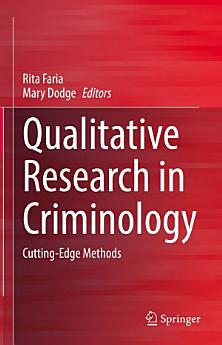Qualitative Research in Criminology: Cutting-Edge Methods
About this ebook
This volume is an essential read for graduate students and researchers in criminology and other social science disciplines interested in qualitative empirical research and informed policy making.
About the author
Rita Faria, School of Criminology and Interdisciplinary Research Center on Crime, Justice and Security, University of Porto
Rita Faria is Assistant Professor at the School of Criminology - University of Porto, Director of the Interdisciplinary Research Center on Crime, Justice and Security and Director of the only Ph.D. program in Criminology in Portugal. She earned her Ph.D in Criminology in 2016, and has a B.A. in Law and an M.A. in Sociology. Currently, she is co-chair of the Working Group on Qualitative Research Methodologies and Epistemologies (WG-QRME) and president of the Working Group on Organisational Crime (EUROC), both from the European Society of Criminology. She has extensive experience in teaching, supervising and researching and her preferred topics of research include white-collar, occupational and corporate crime and, more recently, environmental crimes. She has also developed her expertise on the uses of qualitative methods in criminological research and onethics and integrity in research.
Mary Dodge, School of Public Affairs, University of Colorado DenverMary Dodge earned her Ph.D. in 1997 in criminology, law and society from the School of Social Ecology at the University of California, Irvine. She received her B.A. and M.A. in psychology from the University of Colorado at Colorado Springs. She is a full professor at the University of Colorado Denver in the School of Public Affairs. She and Gilbert Geis co-edited the book Lessons of Criminology and share authorship on the book Stealing Dreams: A Fertility Clinic Scandal. She is the author of Women and White-Collar Crime and co-author of Introduction to Criminal Justice: Systems, Diversity, and Change. She is the recipient of numerous University awards for excellence in teaching, research, and service. Her applied and policy research involves collaboration with law enforcement agencies including organizational assessments, victims focusgroups, system responses to sexual assault victims, driving under the influence of marijuana, and research with California POST.





